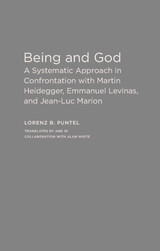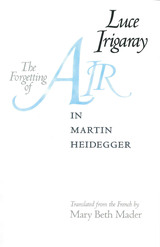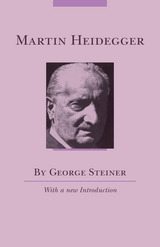

A well-known art historian and an intimate friend of Heidegger's, Heinrich Wiegand Petzet provides a rich portrait of Heidegger that is part memoir, part biography, and part cultural history. By recounting chronologically a series of encounters between the two friends from their meeting in 1929 until the philosopher's death in 1976, as well as between Heidegger and other contemporaries, Petzet reveals not only new aspects of Heidegger's thought and attitudes toward the historical and intellectual events of his time but also the greater cultural and social context in which he articulated his thought.

French philosopher Luce Irigaray has become one of the twentieth century's most influential feminist thinkers. Among her many writings are three books (with a projected fourth) in which she challenges the Western tradition's construals of human beings' relations to the four elements—earth, air, fire, and water—and to nature. In answer to Heidegger's undoing of Western metaphysics as a "forgetting of Being," Irigaray seeks in this work to begin to think out the Being of sexedness and the sexedness of Being.
This volume is the first English translation of L'oubli de l'air chez Martin Heidegger (1983). In this complex, lyrical, meditative engagement with the later work of the eminent German philosopher, Irigaray critiques Heidegger's emphasis on the element of earth as the ground of life and speech and his "oblivion" or forgetting of air.
With the other volumes (Elemental Passions and Marine Lover of Friedrich Nietzsche, published elsewhere) in Irigaray's "elemental" series, The Forgetting of Air offers a fundamental rereading of basic tenets in Western metaphysics. And with its emphasis on dwelling and human habitation, it will be important reading not only in the humanities but also in architecture and the environmental sciences.

"It would be hard to imagine a better introduction to the work of philosopher Martin Heidegger."—George Kateb, The New Republic

One of the century’s greatest philosophers, without whom there would be no Sartre, no Foucault, no Frankfurt School, Martin Heidegger was also a man of great failures and flaws, a Faustus who made a pact with the devil of his time, Adolf Hitler. The story of Heidegger’s life and philosophy, a quintessentially German story in which good and evil, brilliance and blindness are inextricably entwined and the passions and disasters of a whole century come into play, is told in this brilliant biography.
Heidegger grew up in Catholic Germany where, for a chance at pursuing a life of learning, he pledged himself to the priesthood. Soon he turned apostate and sought a university position, which set him on the path to becoming the star of German philosophy in the 1920s. Rüdiger Safranski chronicles Heidegger’s rise along with the thought he honed on the way, with its debt to Heraclitus, Plato, and Kant, and its tragic susceptibility to the conservatism that emerged out of the nightmare of Germany’s loss in World War I. A chronicle of ideas and of personal commitments and betrayals, Safranski’s biography combines clear accounts of the philosophy that won Heidegger eternal renown with the fascinating details of the loves and lapses that tripped up this powerful intellectual.
The best intellectual biography of Heidegger ever written and a best-seller in Germany, Martin Heidegger: Between Good and Evil does not shy away from full coverage of Heidegger’s shameful transformation into a propagandist for the National Socialist regime; nor does it allow this aspect of his career to obscure his accomplishments. Written by a master of Heidegger’s philosophy, the book is one of the best introductions to the thought and to the life and times of the greatest German philosopher of the century.
READERS
Browse our collection.
PUBLISHERS
See BiblioVault's publisher services.
STUDENT SERVICES
Files for college accessibility offices.
UChicago Accessibility Resources
home | accessibility | search | about | contact us
BiblioVault ® 2001 - 2024
The University of Chicago Press









